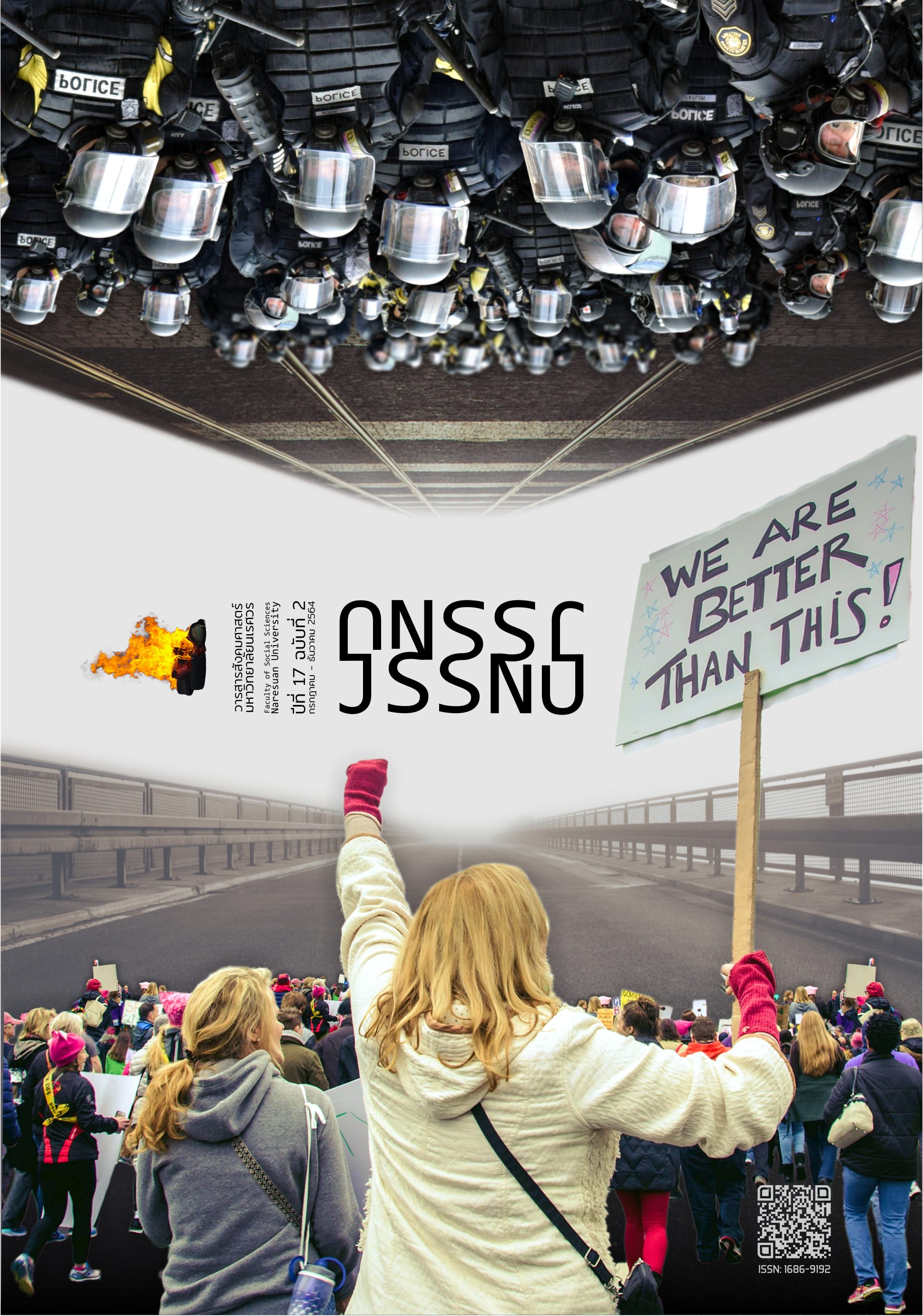So Lang: The Establishment of Commons Through Land-grabbing by Southern Peasants of Thailand
Main Article Content
Abstract
This article analyzes the concepts of common through lands occupation and communities’ management after the land occupation of Southern Peasants Movement. My purpose is to make a new understanding about the concepts of common of Southern Peasants Movement. The research question is how the concepts of common operated by Southern Peasants. I argue that So Lang or common of Southern Peasants Movement is distinctive from the two previous common perspectives, which can be divided into two groups of scholars. The first group described the Common as a chaos, so the state has to direct the disorder lands of common into private properties. The second group explained the Common is rooted in the community, which is based on culture. However, in the case of Southern Peasants Movement, the peasants are not rooted in the culture-based community, but they form a movement to struggle against the land-grabbing of the state, who is cooperated with capitalists in the last three decades. They negotiated with the state by forming new common through occupation lands of capitalists and designed managed the taken properties as a common. Therefore, establishment of commons, in this case, do not lead to chaos and do not rely on cultural roots of community. The finding leads to rethinking about the concepts of common which distinct from these two groups of scholars.
Downloads
Article Details
References
Aphorn, V. (2014). Community land titles and livelihood security for Southern farmers. Journal of Social and Anthropology, 33(1), 105-139. [in Thai].
Ariyaviriyanant, V. (2009). Development of land reform in Thailand: A case study on the passing of land reform law (B.E.2475-B.E.2518) (master’s thesis). Bangkok: Chulalongkorn University. [in Thai].
Berkes, F. (1989). Cooperation from the perspective of human ecology. In F. Berkes (Ed.), Common property resources: Ecology and community-based sustainable development (pp. 70-88). London: Belhaven Press.
Berkoff, D. J. W. (1976). Land and development in South Thailand. South-East Asian Spectrum, 4(2), 44-55.
Bollier, D., & Helfrich, S. (2019). Free, fair, and alive: The insurgent power of the commons. Canada: New Society.
Bundhuwong, C., & Unno, A. (2003). Economic dynamics of the village community in the upper Southeastern of Thailand (Research Report). Bangkok: The Thailand Research Fund [in Thai].
Chariamphan, P. (2012). Politics of community land title deeds policy making process (master’s thesis) Bangkok: Chulalongkorn University. [in Thai].
Chiengthong, J. (2014). Thai rural from the past to the future. Chiang Mai: Thai Universities for Healthy Public Policies. [in Thai].
Dondee, S. (2016). Dynamics of the land reform movement in Thailand after the 1997 constitution: Case study land reform network of Thailand (master’s thesis). Bangkok: Chulalongkorn University. [in Thai].
Gordon, H. S. (1954). The economic theory of a common-property resource: The fishery. The Journal of Political Economy, 62(2), 124-142.
Hardin, G. (1968). The tragedy of the commons. Science, 162(3859), 1243-1248.
Jongquin, P. (1964). Agricultural land use in Surat Thani (Bachelor’s thesis). Bangkok: Kasetsart University. [in Thai].
Kaewsen, W. (2016). Method of political movement of landless group: A case study on expired concessions of palm oil plantations areas in Plypraya district Krabi province (master’s thesis). Nonthaburi: Sukhothai Thammathirat Open University. [in Thai].
Kaewsuwan, N. (1994). Development of rubber production and trade in South Thailand, 1945-1973 A.D. (master’s thesis). Bangkok: Silpakorn University. [in Thai].
Kaiyoorawongs, S. (Ed.). (2006). Uncovering the truth, inspection of the monoculture lease agreement. Surat Thani: Land reform network for the poor in Southern Thailand. [in Thai].
Macpherson, C. B. (1978). Property: Mainstream and critical positions. Toronto: University of Toronto Press.
Manzini, E. (2019). Politics of the everyday (Designing in dark times). New York: Bloomsbury Visual Arts.
Nartsupha, C., & Chanikornpradit, P. (1997). The village economy in the Southeastern of Thailand in the past. Bangkok: Sang San. [in Thai].
National Statistical Office. (2014). 2013 agricultural census Southern region. Bangkok: National Statistical Office Ministry of Information and Communication Technology. [in Thai].
Ostrom, E., & Hess, C. (2000). Private and common property rights. In G. D. Geest (Ed.), Encyclopedia of law and economics (pp. 332-379). Cheltenham: Edward Elgar Publishing Limited.
Öztürk, M., Jongerden, J., & Hilton, A. (2017). Commodification and the social commons: Smallholder autonomy and ‘Rurban’ relations in Turkey. In G. Ruivenkamp & A. Hilton (Eds.), Perspectives on commoning: Autonomist principles and practices (pp. 257-290). London: Zed Books.
Pintobtang, P. (1997). The politics of grassroots environtal movement in Thai society (Doctoral dissertation).
Bangkok: Chulalongkorn University. [in Thai].
Prachumrat, S. (2006). Full research paper of the Southern community studies, case study: Communities forest in Surat Thani province. N.P.: n.p. [in Thai].
Raekphinit, C (1994). Labor sharing: The economic and socio-cultural relationship of villagers in the South of Thailand (Research Report). Songkhla: The Institute for Southern Thai Studies. [in Thai].
Ramitanondh, S., Ganjanapan A., & Ganjanapan, S. (1993). Community forests in Thailand: Development approach in Northern of Thailand (volume 2): Potential of villagers’ organizations to manage community forests. Bangkok: Local Development Foundation. [in Thai].
Ruivenkamp, G. (2017). Seeds: From commodities towards commons. In G. Ruivenkamp & A. Hilton (Eds.), Perspectives on commoning: Autonomist principles and practices (pp. 381-416). London: Zed Books.
Santasombat, Y. (1999). Biodiversity and indigenous knowledge for substainable development. Chiang Mai: Biodiversity and Indigenous Knowledge for Substainable Development Center Faculty of Social Sciences Chiang Mai University. [in Thai].
Sirichai, L., Nuthong, U., Thammachat, S., Muneemonai, S., & Kitikul, N. (2003). Southern community rights. Bangkok: Nititham. [in Thai].
Stavrides, S. (2016). Common space: The city as commons. London: Zed Books.
Sumnuanyen, K. (2006). Dynamic battle strategy social movement: The dynamics of the battle strategy of the social movement: A case study of the movement for land rights in Lamphun (master’s thesis). Bangkok: Chulalongkorn University. [in Thai].
Tubpun, S., & Prachuabmoh, C. (1992). The evolution of forest reclamation in Southern Thailand. In J. Pinthong (Ed.), The evolution of forest reclamation (pp. 321-379). Bangkok: Local Development Institute. [in Thai].
Usher, A. D. (2009). Thai forestry: A critical history. Chiang Mai: Silkworm Books.


